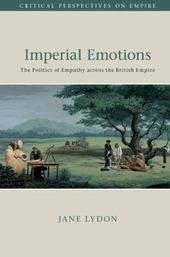
|
Imperial Emotions: The Politics of Empathy across the British Empire
Hardback
Main Details
Description
Emotions are not universal, but are experienced and expressed in diverse ways within different cultures and times. This overview of the history of emotions within nineteenth-century British imperialism focuses on the role of the compassionate emotions, or what today we refer to as empathy, and how they created relations across empire. Jane Lydon examines how empathy was produced, qualified and contested, including via the fear and anger aroused by frontier violence. She reveals the overlooked emotional dimensions of relationships constructed between Britain, her Australasian colonies, and Indigenous people, showing that ideas about who to care about were frequently drawn from the intimate domestic sphere, but were also developed through colonial experience. This history reveals the contingent and highly politicised nature of emotions in imperial deployment. Moving beyond arguments that emotions such as empathy are either 'good' or 'bad', this study evaluates their concrete political uses and effects.
Author Biography
Jane Lydon is Professor of History and Wesfarmers Chair of Australian History at the University of Western Australia. Her research centres upon Australia's colonial past and its legacies in the present. She worked as an archaeologist before becoming a historian, and retains an interest in diverse forms of evidence for the past, especially photographic archives.
Reviews'Jane Lydon offers a scintillating and innovative analysis of the role of the emotions in binding together dispersed imperial communities, a connection critically reliant on who was excluded from the empathy at the heart of this endeavour. Attentive to a broad body of scholarship, Lydon's is a fresh and persuasive take on empire and on the history of emotions.' Philippa Levine, University of Texas, Austin 'This brilliant book will change the way you think about the history of the empire. In crystal-clear prose, Lydon reveals how emotion propelled the making of the British empire, while also offering a deeper understanding of how some of its worst legacies might be unravelled.' Ann McGrath, Kathleen Fitzpatrick ARC Laureate Fellow, Australian National University
|